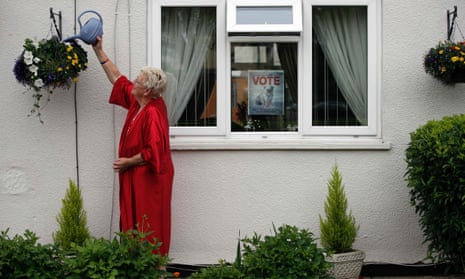I haven’t been an expatriate very long. I came to America in February, when London and New York were the same temperature. Now, the city I moved to is hotting up, the one I left behind sloshed with rain, easing itself imperceptibly into the pattern of tepid weekends we call summer. I watch videos of submerged streets half smug, half wistful.
I’m still yet to shed the cultural habits – such as talking about the weather – that mark me out as British. I won’t list them, but all the cliches are still very much in evidence. I haven’t minded, because it’s not a bad brand to be associated with: small but big, ancient but modern, an island but one open to the world.
Suddenly that image has been destroyed, and I feel a sense of grief which is entirely new to me. This is not a personal tragedy. It’s a constitutional melting, out of which something different will eventually be fashioned. But I can usually put political events into a box marked: “it’s fine no one died”. Tragically, that bromide quite doesn’t hold this time. Even so, I didn’t expect to find myself, as I wandered through the streets of Manhattan yesterday evening – glued to my phone, overshooting my destination by several blocks – shaking with tension.
Separated from my lifelong friends and family by thousands of miles, but desperate to express myself, I tweeted a bit too much. I railed and ranted in disbelief, and wrote: “If this is really happening I have to fundamentally rethink how I relate to the world in terms of citizenship, fellowship, my ‘nationality’”. Melodramatic, huh? But as I look at it now, in the air-conditioned morning, it seems about right. Citizenship, fellowship, nationality – these are all inventions, things in the mind. But we’ve brought them into being again and again through history because we have a yearning for a sense of home that goes beyond the concrete. A sense not so much of where you belong – but of who you belong with. The elements of personhood you pick from a menu written by all the people who occupied this space before you: a sense of humour, solidarity with the weak, eccentricity, liberalism, self-deprecation, an addiction to shit tea from dusty teabags.
When I was at high school – in what was revealed last night to be one of the most solidly anti-EU parts of England – we felt European. There was an exchange programme to Spain, we went on coach trips to Austria, the headmaster flew the European flag from the top of one of the buildings. And all of that felt good. We weren’t just some irrelevant bunch of kids in the sticks, we were connected. In politics classes we learnt about the European institutions. How they were built on hope, with idealism, underpinned by a belief that human beings can organise themselves better. What a contrast with the Conservative rump still leading us in little England: refusing to consider constitutional reform, refusing to appoint a minister for Europe, refusing to take responsibility for selling arms to Iraq, refusing to scrap homophobic laws.
Those of us who believed in human rights and collective endeavour thanked god for the European Union – it was the political saving grace of the United Kingdom, as far as we were concerned.
Now, it’s gone.
And I thought I was going to be covering a topsy-turvy time in American politics. That has proven to be the case. But I believe voters here will elect Hillary Clinton in five months’ time. I never thought that, more rapidly than I could have imagined, British politics would eclipse anything I’ve seen here in terms of tragedy and farce. The Leave campaign peddled shameful lies, lies that have permanently damaged us. They will now have to reckon with people angry at their failure to deliver what they promised. It is going to be ugly.
The worst of it is that the catastrophe was entirely preventable. David Cameron did not have to call a referendum. A referendum with a simple majority is a stupid way to decide on far-reaching constitutional change. As my politics lessons also taught me, here in the states you need a two-thirds majority in two-thirds of the states to carry out that kind of major surgery. And it’s still democracy.
Tonight I will go drinking, and talk with my British pals about how we can’t believe what’s happened. What will we be returning to when our time here comes to an end? I turned my back for what seems like a second, and my country seems to have voluntarily dismembered itself. Where’s home now?

